
HORIST: China’s secret advantage is its ruling class
I have travelled to China on business enough to qualify as one of those “old China hands” – and for several years served as Foreign Investment Advisor to the city of Harbin. I watched China exceed 9 percent annual economic growth and zoom past every world economy, except the United States – which currently comes in second based on a Gross Domestic Product (GDP) of approximately $19 trillion.
On the eve of the millennia, I made a bold prediction that rankled a lot of my conservative friends – especially the neocons. I stated my belief that China – then in fourth place in world economies — would be the dominant world economy of the Twenty-First Century. China has moved from a $4 trillion economy to a $12 trillion economy in less than 10 years — and the Chinese growth rate exceeds the United States by more than 4 percent annually.
It is ironic that my fellow conservatives should be so upset with China. Back in the old red scare days, we wanted China to come out from behind the Bamboo Curtain and embrace more free-market capitalism. Since Nixon brought them to the table, they have discovered the benefits of free(er) trade – although their expropriation of our intellectual property and unfair trade practices remain a problem.
To understand the China advantage, you had to look at Japan. Following their defeat in World War II, Japan rose from the atomic ashes of Nagasaki and Hiroshima to become a powerful world economy. They did it with a 1945 market population of 72 million consumers, a male work force that had been decimated by the War (reducing the pre-War population by 1.5 percent), and very little in natural resources on their island nation. Yet, within a few decades, Japan became a major source of the once iconic western products, including German lenses and American autos and steel. It became the second largest economy in the world.
Conversely, China has a consumer population of 1.4 billion people – and some estimates place it at more like 1.7 billion due to a flawed census program and the one-child policy that has resulted in generations of “hidden” children. It is worth pondering that the potential error in the Chinese population figure – the error, mind you – is almost the size of the entire population of the United States.
A mutual advantage shared by both Japan and China is a work-ethic culture and a unifying national pride that is pervasive among the population of both nations. Having visited several older factories where working conditions are noticeably below U.S. standards, the work hours are long and the pay is low even by China economic standards, I have found the workers to be proud of the products they produce and proud to see their nation rise to world leadership.
None of that, however, may reveal the secret of China’s success or the hidden cause of America’s decline. It is, I believe, the respective ruling classes. By way of explanation, I will take the liberty of lifting a pertinent portion of a 2007 posting from my old personal blog.
“In the United States, the ruling class is the legal profession. It is almost assumed that you cannot serve in public office without being a lawyer. That profession dominates all three branches of government, and a good deal of the entrenched bureaucracy.
On the other hand, the ruling class of China is composed of engineers. Not sure why that is. Maybe the authoritarian rule of pre-Nixon China found little need for lawyers because not a lot of things needed to be adjudicated. The legal profession thrives on two points of view. Dictatorships do not.
Engineers, by their professional nature, are creators, inventors, designers, innovators, builders. They give us the new products that drive a free-market economy. They improve the quality of life and stimulate the production/consumption cycle. Laws and policies in China bend to the perception and well-being of their ruling class.
Our laws and policies also bend to our ruling class; lawyers. While lawyers serve a good purpose in a free society in terms of their professional duties, they are about the last group on earth you want as a ruling class.
By their very nature, lawyer-legislators are counterproductive. They inhibit progress and make all things more expensive. They empower their peers to wreak havoc on the free enterprise system. They entangle citizens, corporate and private, in restraining red tape. They discourage production and innovation.
The litigiousness of our society is well reported. The very fear of litigation is undermining every aspect of American life. Think for a moment how many times litigation and fear of litigation come into play – at home, in the work place, at school, in restaurants, at sport events. Every aspect of our civic life suffers from hyper-litigation. How many times do your read about ridiculous law suits – with ridiculous settlements?
It is an exponential problem because even as the practitioners increase litigation under current laws, the lawyer-legislators are passing new laws to create more opportunities and exclusivity for their professional colleagues.
A generation ago, I could form a corporation for a small fee, and no help from a lawyer. That is not so easy or cheap today.
A generation ago, I could set up a not-for-profit civic group in a few days for a small fee, and no lawyers. Today, the process requires reams of paper and stacks of dollars for the attorney.
A generation ago, I could close on real estate with a few papers and no lawyer. Today it takes more reams of paper and thousands of dollars in legal fees.
A generation ago, I could effectively represent myself in court. Today, lawyer-generated laws and self-serving court procedures make that impossible. We have literally lost our right of self-representation.
A generation ago, a teacher could discipline a child without fear of civil or criminal charges. Today, our education system flounders – and some due to inability to impose discipline.
It goes on and on.
We are suffering from lawyer-induced civic paralysis. In many ways, they are like a medicine that is beneficial in its prescribed dosage, but lethal when overly consumed. America is definitely overdosing on lawyers in government. Add it all together, and you can see why America cannot compete effectively against the growing consumer and technology-driven Chinese free-market.
In many ways, China and the United States are still far apart on the free market continuum. How far apart is debatable. What is less arguable is the fact that China is heading in the right direction, and the U.S. is heading in the wrong direction. While they are opening more and more free market opportunities, we are slowly suffocating them with excessive laws, regulations, and litigation.”
Chinese students take up engineering of every sort like American students flock to the law schools. This includes the cutting-edge computer courses. Though little known outside China, the Harbin Engineering University – which I have visited on many occasions — compares favorably with MIT and other top American schools, but is considered second tier in China. China produces 600,000 engineering graduates every year, while the United States produces a meager 70,000.
We know that our Founders never conceived of a ruling class. We were to be represented in our Republic by part-time legislators from all walks of life. And the impact we see in the comparison with China is not theoretical or irrelevant. In America, a lift ticket at a ski resort is 42 percent liability insurance. In China it is less than one percent. One of the largest portions of medical cost is liability insurance. Consider those ubiquitous television advertisements by ambulance-chasing attorneys eager to sue over every new FDA approved drug, every new medical device or every surgical procedure.
To put the problem in a different perspective, just imagine that all those lawyers holding elected and appointed officer were car salesmen. Taxpayers could be subsidizing gasoline to 25 cents a gallon. We might have endless highways. Would public transportation be banned? Would auto manufacturers be essentially immune from law suits, as lawyers are today. Yes, that sounds ridiculous. But maybe no more ridiculous and corruptive than having lawyers in control of everything.
Of course, there are a lot of other reasons China will outperform the United States. They have enormous untapped natural resources. They still have a wage scale advantage. Their national debt is 41 percent of the Chinese GDP, while the U.S. debt is $21 trillion, or 77 percent of the American GDP. They are the manufacturing hub for not only the U.S., but the entire world. China’s foreign policy is 10 percent military and 90 percent commerce. They can undertake projects on the grandest scale – the Three Gorges Dam, the world’s largest radio telescope and the most advanced computers. China holds approximately one-fifth of the entire U.S. debt – an economic Sword of Damocles over the U.S. economy.
More than 15 years ago, I put forward my view of the globalization of the Chinese economy in the Harbin Business Exchange newsletter.
“When we first began this (Harbin Business Exchange) newsletter more than three years ago, we predicted the coming of Chinese investment to America – which was virtually non- existent at the time. We identified what we called the “five waves of Sino-American business activities”, which were (1) outsourcing for importation to the U.S., (2) establishing factories to manufacture for the American market, (3) selling to the growing Chinese market, (4) capital investment based on financial return in Chinese projects, and (5) predicting the eventual investment of Chinese money in the U.S. Now with the move by Haier to acquire Maytag and China National Offshore Oil Company to take over Unocal, the fifth wave is clearly upon us. This trend will likely develop with the lightning speed that seems characteristic of all things related to the Chinese economy. Of course, these investments cause some concern (as did the long-ago investments by the enriched Japanese entrepreneurs.) There will have to be reciprocity of investment opportunity, in terms of both investment policies and available sectors.”
To his credit, President Trump has put America on a more aggressive track in meeting the challenges of China. He is addressing the trade imbalance and exploring ways to sanction China for intellectual property violations.
But now for the really bad news. Even if Trump is hugely successful in improving the situation with China, it is not likely it will reverse the current momentum in China’s favor. China will continue to prosper with a highly energized work force, while U.S. productivity will be sacrificed to shorter work days, longer vacations and earlier retirement. We will continue to over-regulate all facets of our economy despite Trump’s aggressive de-regulation policy. We will continue to retard growth under the rule of lawyers for the foreseeable future, even as Chinese engineers invent, produce and commercialize the Middle Kingdom to new heights of economic growth.
If the United States is to maintain economic leadership on the world stage, it will take a change in culture and a determination that seems very unlikely at this point. Our best medium-term option is to try to cling to the lead even though all projections suggest that China will be the number one economy in the world. The only controversy within ranks of the economic experts is when that will happen.
Larry Horist is a conservative activist with an extensive background in economics, public policy and political issues. Clients of his consulting firm have included such conservative icons as Steve Forbes and Milton Friedman, and he has served as a consultant to the White House under Presidents Nixon and Reagan. He has testified as an expert witness before numerous legislative bodies, including the U. S. Congress and lectured at Harvard University, Northwestern University, Florida Atlantic University, Knox College and Hope College. An award-winning debater, his insightful and sometimes controversial commentaries appear frequently on the editorial pages of newspapers across the nation. He can be reached at lph@thomasandjoyce.com.





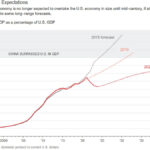





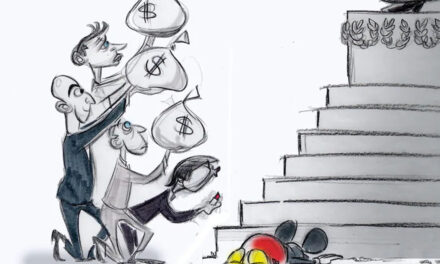



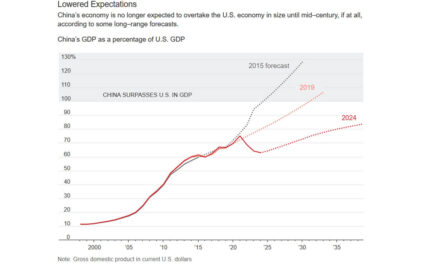
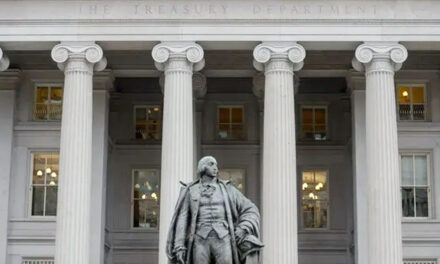






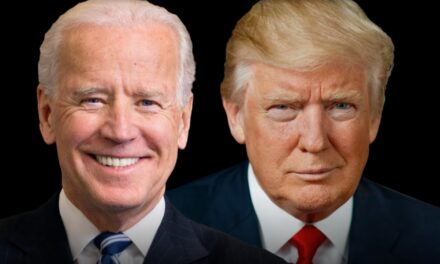

Joe Gilbertson: where are you going with these threats? My free speech is facing intimidation, sometimes physical threats. Is this…
NOT BUSTED. You didn't have to say it. That is what I meant in the above post from me. But…
Just another ruse for taking jabs at Biden through alleged short comings of his. Ten days remaining in Biden's term…
I never said I WANT China to continue to own Panama. You made that up. First,I didn’t say it. Second.…
I absolutely do Not in any way, shape or manner fabricate ANYTHING you say. I do and will always tell…